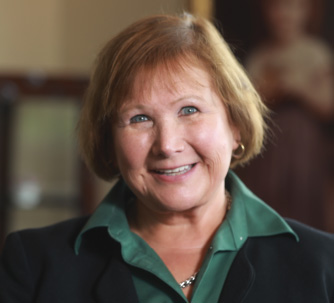Vice President for Community Engagement & Development, WVSOM
By Ken Magill
David Drema Mace Hill never backs down from a challenge. After suffering extensive injuries to her legs and feet, in addition to internal injuries, from a car accident in 1985, she spent the next three years of her life in a wheelchair while learning to walk again.
While accepting social security disability could have been an easy choice for Hill—and she certainly qualified—Hill continued working, and she wouldn’t have had it any other way. The ripple effects being immeasurable, it is impossible to calculate the number of people who have benefited from this decision.
“Choosing to work impacted my career by making me a human that is grateful for every day of life and has motivated me to achieve all I can with the gifts God has bestowed,” says Hill, who today serves as the vice president for community engagement and development for the West Virginia School of Osteopathic Medicine (WVSOM).
With more than three decades of experience working in public health leadership positions for the West Virginia Bureau for Public Health, the Tennessee Department of Health, Vanderbilt’s Nashville Health Management Foundation and Comprehensive Care Center and the Mid-Ohio Valley Regional Health Office, Hill has spent her career focused on serving marginalized populations, building small community infrastructures that are inclusive, equitable and meet the needs of the people served.
“I understand the culture and love people,” she says. “I can’t imagine doing anything else with my life. As the vice president for community engagement and development at WVSOM, I get to utilize my education, experience and skills to do what I love. I appreciate being in a place where innovation and thinking outside the box are not only allowed but much appreciated.”
Hill’s current roles at WVSOM involve providing oversight and direction for the WVSOM Center for Rural and Community Health—a center dedicated to improving the well-being of West Virginians through building infrastructure to empower communities—as well as working with the Office of Attorney General Patrick Morrisey on opioid settlements.
“Due to the work of the Office of the Attorney General, West Virginia has received the largest per capita settlement in the nation,” says Hill. “I appreciate the opportunity to impact the opioid epidemic in West Virginia.”
Hill is not only passionate about her work, but she is also dedicated to giving back. She has volunteered with domestic violence shelters, served on several boards of directors and is actively involved in community projects through her church. For Hill, the most important work she does is with Health Integrated Multisectoral Services (HIMS) in Tanzania, a group she was introduced to in 2018.
“HIMS rescues young girls from female genital mutilation, which is still in practice there,” she says. “I believe what impacts another human across the globe, impacts us all. We can’t have a hole in one side of the boat and think our side won’t sink as well.”
Hill is dedicated to making a difference in all the work she does.
“I am a change agent,” she says. “Innovation usually occurs when people disagree. I never see disagreement as the end of an issue, I see it as the beginning from which you can build. I strive to always practice kindness, even when dealing with challenges and people who are not always kind.”
After spending part of her career working in Tennessee, Hill returned to West Virginia in 2010 to further public health initiatives here.
“I was born and grew up in rural Boone County. We did not have any money, but my six siblings and I had an engaged, godly and loving mother—priceless,” she says. “For me, the mountains are my home. West Virginia is where I learned to be resourceful and think for myself. I am connected to the Mountain State because it is in my blood. The people of the Mountain State are resilient and strong, and I am proud to be among them.”
The Center for Rural and Community Health
The Center for Rural and Community Health (CRCH) was founded in 2010 as a special resource center of the West Virginia School of Osteopathic Medicine (WVSOM).
Under the mission of driving engagement in rural health, the CRCH aims to guide and connect rural and isolated
communities to opportunities and resources to address health priorities. It works with dozens of regional, state and community-based organizations on research-related projects to improve the health and well-being of West Virginians.
Included in the CRCH’s outreach efforts is the Community Health Education Research Person (CHERP) online training for community health workers. Under CHERP, people committed to helping improve the health of rural West Virginians train at three levels: wellness, health promotion and disease prevention and management.
The CRCH has also developed county-specific opioid awareness and prevention toolkits to educate communities to reduce the stigma of substance abuse and provide resources for treatment and recovery. Toolkits have been developed for the 10 hardest-hit counties, with six regional toolkits produced to cover all counties in the state of West Virginia. The CRCH focuses a lot of effort on substance use disorder through prevention programs, community education, treatment and recovery. The CRCH offers services for youth, adults and seniors relative to general wellness, nutrition, exercise and chronic disease and pain management.
In 2019, the CRCH opened the Clingman Center for Community Engagement in historic downtown Lewisburg, WV. The Clingman Center offers an opportunity for community members and local nonprofits to come together to develop community programs and projects. Its purpose is to promote and implement community engagement at the grassroots level. It connects the community to WVSOM and WVSOM students to the community.
Since 2016, the CRCH has been awarded more than $7.5 million in federal, state and local funding.




